Knowing the Source of Your Food
It’s always rewarding to see where your food comes from. Whether it’s at a team-building event at Urban Roots or traveling to another part of the country to see the running of the salmon, pig farms in the midwest or just taking a ride to one of the dairies or chicken farms that are in our neighboring counties, being able to feel the land that brought forth your food brings a shared sense of home.
One of the ways for national programs to reduce the need for more and more industrialization is to use many farms with the same standards and genetics as a supply chain. This accomplishes a couple things. It helps to mitigate natural situations like weather and other random events that crop up on farms. It also helps to keep family farms on the land.
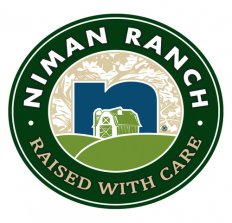 Niman Ranch
Niman Ranch
History: Niman Ranch started in the early 1970s on a small eleven acre ranch in a small coastal town, just north of San Francisco. The animals were raised using traditional, humane husbandry methods and given wholesome all-natural feeds. Before long, Niman Ranch beef became a favorite in local grocery stores and at San Francisco Bay Area restaurants.
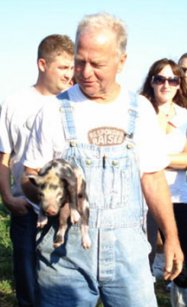 In 1995, Niman Ranch added pork to its offering when Paul Willis, of Thornton Iowa was working to revitalize sustainable hog farming methods in the Midwest. Paul's commitment to raise hogs in a humane, old-fashioned way matched Niman Ranch's own principles. Niman Ranch now offered beef, pork and lamb - as rancher Jeannie McCormack had been raising lamb for Niman Ranch since 1992.
In 1995, Niman Ranch added pork to its offering when Paul Willis, of Thornton Iowa was working to revitalize sustainable hog farming methods in the Midwest. Paul's commitment to raise hogs in a humane, old-fashioned way matched Niman Ranch's own principles. Niman Ranch now offered beef, pork and lamb - as rancher Jeannie McCormack had been raising lamb for Niman Ranch since 1992.
Today, the Niman Ranch network has grown to include over 650 independent American farmers and ranchers. Whether they raise hogs, beef or lamb, they all share Niman Ranch's dedication to strict protocols and the belief that all-natural, humane and sustainable methods produce great flavor.
- Humanely Raised by the Largest Network of U.S. Family Farmers and Ranchers
- Never Given Antibiotics or Added Hormones - Ever
- Fed Only the Finest All Vegetarian Feeds
Going Beyond Natural: They go beyond the USDA definition of natural (minimally processed - no artificial ingredients) because they believe it also means the animals have been raised humanely, without antibiotics or added hormones and fed an all natural vegetarian diet. At Niman Ranch, “naturally raised” isn’t a trend. Naturally raised has been their business and passion for over 30 years. Their mission has remained steadfast: to raise livestock traditionally, humanely, and sustainably to deliver the finest tasting meat in the world.
Breeds:The finest tasting meat in the world starts with the finest breeds. To obtain the quality of marbling and tenderness that Niman Ranch pork has become famous for, they suggest Niman farmers raise a genetic cross of Durok, Berkshire and Chester White hogs. All of the cattle in the Niman Ranch program are from Angus breeds.
Feeds: You care about what you and your family eat. That’s why Niman cares about what their animals eat too—and maybe more importantly what they don’t. All their livestock are fed all vegetarian feeds. They are never given added hormones, antibiotics or animal by-products—ever.
Animal Care: We know that an animal’s quality of life impacts the quality of the meat we eat. Niman Ranch has the strictest rules for how livestock is raised. The hogs spend their time out of doors and in deeply bedded pens, with continual access to fresh water and protection from the elements. The cattle and lamb are raised on pasture and then finished on high quality feeds on lots where they are provided with plenty of space and access to water and feed.
Third Party Verification: Niman Ranch is proud to have to have set the industry standard, for sustainable and humane practices. They have worked with animal handling expert and renowned author Dr. Temple Grandin to further improve their program.
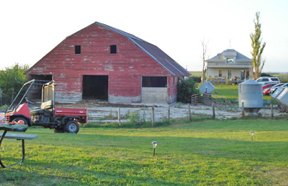 Farm Visits — I Saw for Myself How the Animals are Raised
Farm Visits — I Saw for Myself How the Animals are Raised
I have been to Paul Willis’ pig farm in Iowa. Situated amongst corn farms, it is picturesque and smells alive. After you put on your boot-length shoe covers you approach a field of hogs. Round open-ended shelters appear out of the dust and corn. Sows and piglets are lounging about in their shelters. Some piglets run after each other, curious about the strangers, then seek the safety of their mothers. The land looks a little chewed over, but it is hog heaven.
Even though Paul Willis is one of the founders of Niman Ranch, when his farm’s turn comes, one of the inspectors from Niman Ranch’s third party organization will come make sure that his farm is living up to the breeding and feed standards and all of the humane treatment standards that all Niman Ranch farms adhere to.
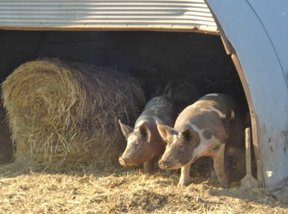 I, along with many other people, was given a tour of this hog farm as part of a yearly celebration event that Niman Ranch holds for their hog farmers. Several chefs are chosen from around the country to prepare a very special meal for the farmers. Niman also give out educational grants for the children of farmers who are planning to go into the agriculture business.
I, along with many other people, was given a tour of this hog farm as part of a yearly celebration event that Niman Ranch holds for their hog farmers. Several chefs are chosen from around the country to prepare a very special meal for the farmers. Niman also give out educational grants for the children of farmers who are planning to go into the agriculture business.
When I attended, the median age for farmers was continuing to go up and most of the younger generation were not interested in becoming farmers. The last I heard, things were starting to improve and younger folks were getting more excited about keeping the family farms. Keeping family farms and helping to make them financially viable is one of the core beliefs of the Niman Ranch organization.
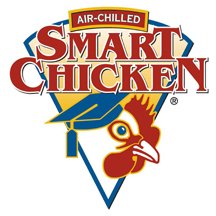 Smart Chicken
Smart Chicken
I’ve also been to the Smart Chicken Organic Farm in Nebraska. Their organic antibiotic-free line is produced by family farms in Nebraska, Iowa and Kansas. It is far more challenging to maintain certifications of many small farms than just the one.
The organic barns are nestled into the Nebraska countryside. Chickens are very sensitive to moisture and temperature, so the climate inside the large barns where they are housed is carefully regulated. About every three feet, a door is open where the chickens are free to go outside and eat bugs and small rocks while still being protected from predators. The barns are odor free and the chickens are docile and surprisingly quiet. Even when being transported to the processing facility, they are calm and stress-free. The organic farm is certified humane, not all of the family farms use the same size barns and Smart Chicken has not required that they change this. This is one of the ways that Smart Chicken helps to support their chicken farmers.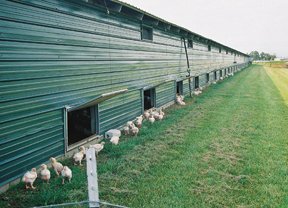
It is rewarding to maintain relationships with those who share our high standards. I am proud that Wheatsville contributes to making viable agricultural businesses, which is at the very heart of sustainability.